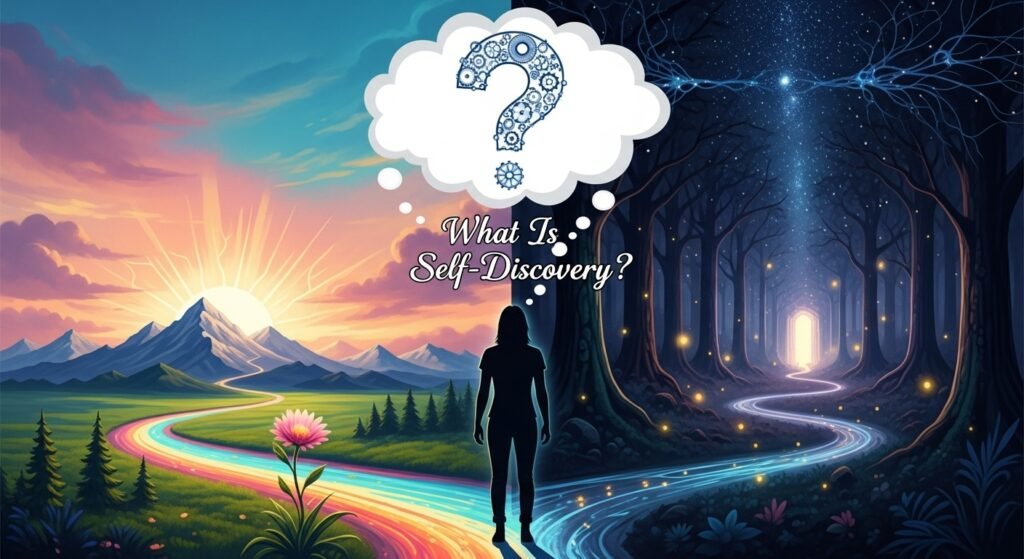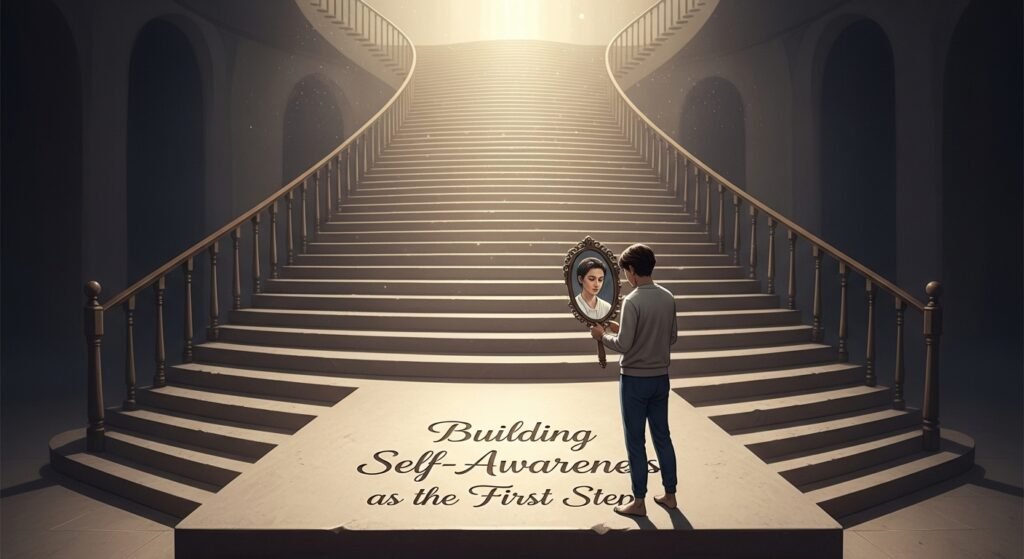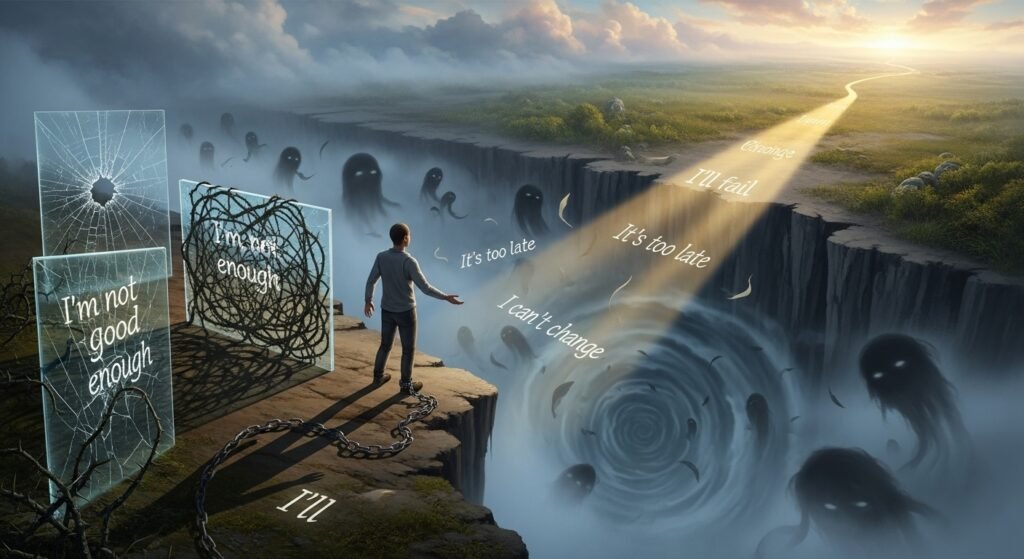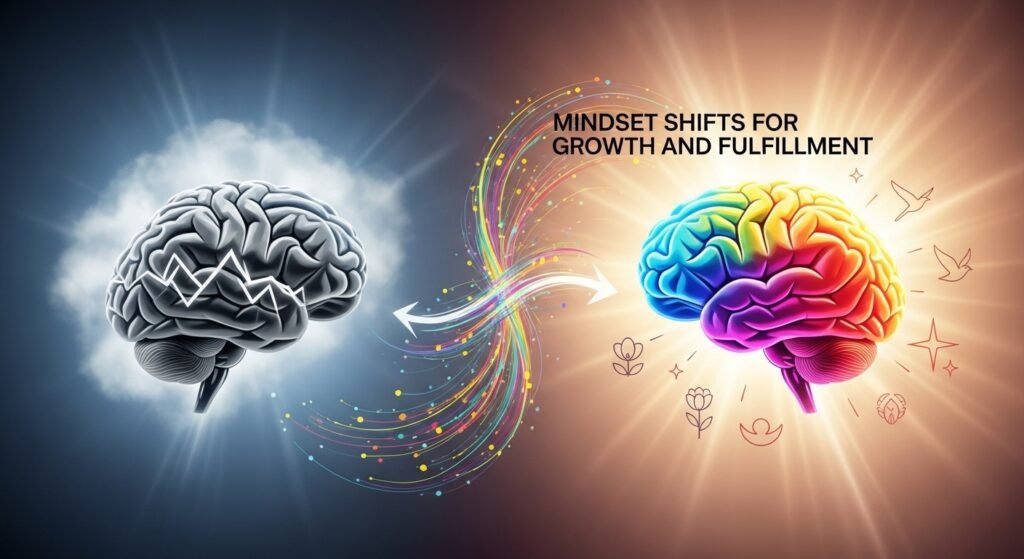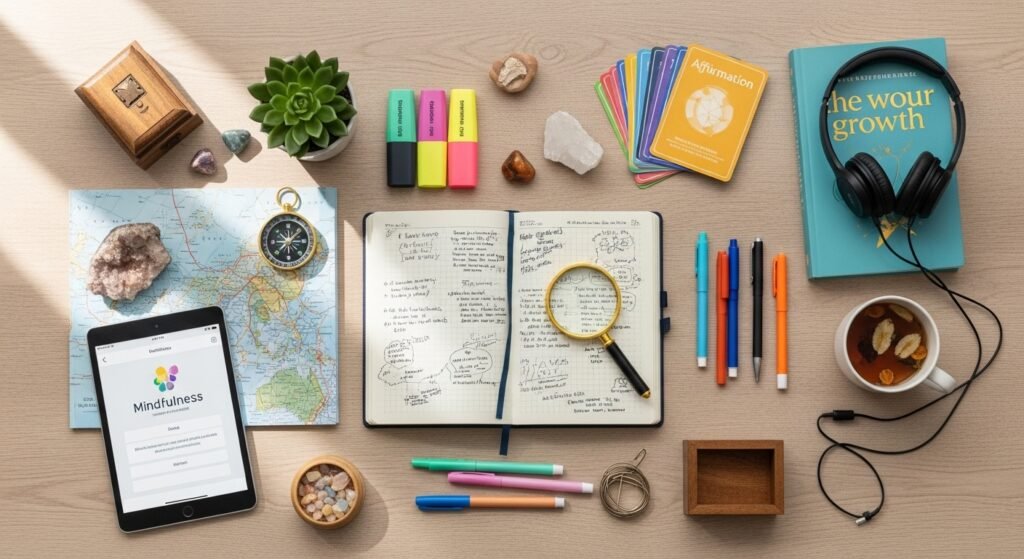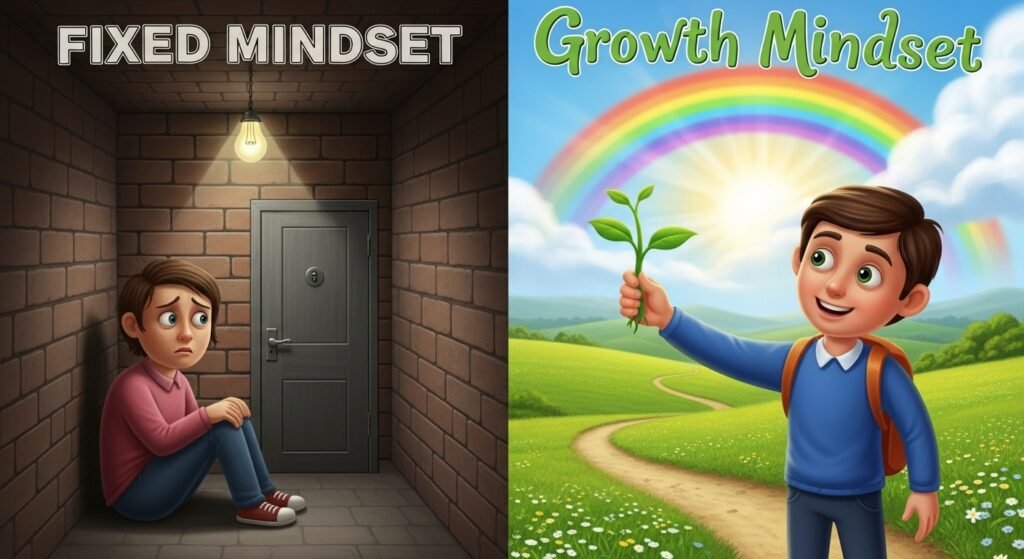📑 Table of Contents
- Introduction: Why Self-Discovery Matters
- What Is Self-Discovery?
- Building Self-Awareness as the First Step
- Identifying and Overcoming Limiting Beliefs
- The Role of Emotional Intelligence in Unlocking Potential
- Mindset Shifts for Growth and Fulfillment
- Spiritual Practices That Support Inner Discovery
- Daily Habits That Build Long-Term Success
- Tools and Resources for Self-Discovery
- Case Study: From Confusion to Clarity
- Comparative Table: Fixed vs. Growth Mindset
- FAQs About Self-Discovery
- Final Thoughts: Embrace Your Unique Journey
1. Introduction: Why Self-Discovery Matters
Self-discovery is more than a buzzword—it’s the foundation of a fulfilling life. Without it, people often chase external goals, approval, or material success without ever feeling truly satisfied.
When you begin the journey of discovering yourself, you uncover your deepest values, passions, and inner strengths.
This process allows you to align your daily choices with what actually matters to you. The benefits are endless—greater confidence, stronger relationships, career clarity, and emotional resilience.
In short, self-discovery gives you the roadmap to live with authenticity and purpose.
Key Points:
- Helps align your life with your true purpose.
- Reduces dependence on external validation.
- Boosts confidence and decision-making power.
- Strengthens emotional and mental well-being.
- Creates a sense of balance in life.
- Empowers you to live authentically.
2. What Is Self-Discovery?
At its core, self-discovery is about uncovering the layers of who you are.
Many of us grow up adopting beliefs, habits, and roles shaped by family, culture, or society. While these influences help us adapt, they can also hide our authentic selves.
Self-discovery is the process of peeling back these layers to find clarity on your true identity.
It doesn’t mean rejecting your past but rather understanding which parts serve you and which don’t. It’s a lifelong process that evolves with age and experience.
Key Points:
- Involves exploring personal values, passions, and strengths.
- Helps differentiate between societal expectations and authentic desires.
- Evolves over time as life circumstances change.
- Encourages deeper understanding of your unique identity.
- Builds clarity for future decisions.
- Provides the foundation for personal growth.
3. Building Self-Awareness as the First Step
Self-awareness is the entry point into self-discovery.
Without it, we remain blind to our habits, patterns, and triggers. Building self-awareness means observing your thoughts, emotions, and behaviors with honesty.
Journaling is one of the simplest tools to achieve this—you gain perspective by writing about your feelings daily.
Meditation and mindfulness also help you slow down and notice what drives your actions. Seeking feedback from trusted friends or mentors adds another layer of clarity.
By cultivating self-awareness, you begin to make conscious rather than automatic choices.
Key Points:
- Journaling helps identify recurring patterns.
- Mindfulness builds presence and reduces autopilot behavior.
- Feedback provides perspective on blind spots.
- Awareness reduces emotional reactivity.
- Encourages conscious decision-making.
- Builds the foundation for transformation.
4. Identifying and Overcoming Limiting Beliefs
Most people carry hidden beliefs that hold them back—such as “I’m not smart enough,” “I don’t deserve love,” or “Success isn’t for people like me.”
These beliefs are often formed in childhood but continue to influence adult life. Recognizing them is the first step to overcoming them.
Techniques like cognitive reframing, positive affirmations, or professional coaching help replace limiting beliefs with empowering ones.
Once you shift these inner narratives, you remove barriers that keep you from reaching your true potential.
Key Points:
- Limiting beliefs often come from childhood conditioning.
- They affect self-esteem and decision-making.
- Awareness is the first step to breaking them.
- Cognitive reframing changes the perspective.
- Affirmations help build empowering narratives.
- Overcoming them unlocks hidden opportunities.
5. The Role of Emotional Intelligence in Unlocking Potential
Emotional intelligence (EQ) is essential in self-discovery because it helps you understand and manage both your emotions and those of others.
A person with high EQ is better equipped to handle stress, resolve conflicts, and build stronger relationships.
Self-discovery without emotional intelligence often leads to self-centeredness, but with EQ, it creates empathy and balance.
Practices like active listening, naming emotions, and self-regulation exercises deepen your emotional intelligence.
As you grow in EQ, you become more resilient and adaptable—qualities necessary for unlocking your potential.
Key Points:
- EQ combines self-awareness, self-regulation, empathy, and social skills.
- Helps navigate conflicts with grace.
- Builds deeper and healthier relationships.
- Improves leadership and teamwork.
- Enhances resilience in stressful situations.
- Strengthens the foundation of self-discovery.
6. Mindset Shifts for Growth and Fulfillment
The difference between a fixed mindset and a growth mindset is the difference between stagnation and transformation.
A fixed mindset views abilities as unchangeable, while a growth mindset sees challenges as opportunities to learn.
Shifting to a growth mindset means reframing failure as feedback and persistence as the key to mastery.
This mindset creates resilience, optimism, and an openness to lifelong learning. It’s one of the most powerful shifts you can make in your journey of self-discovery.
Key Points:
- Fixed mindset blocks growth and potential.
- Growth mindset embraces learning and change.
- Failures become lessons, not obstacles.
- Builds resilience during tough times.
- Encourages creativity and problem-solving.
- Supports lifelong transformation.
7. Spiritual Practices That Support Inner Discovery
Spirituality often acts as a compass in self-discovery.
While it doesn’t have to be religious, it connects you with something greater than yourself—whether it’s nature, meditation, or universal energy.
Spiritual practices provide perspective, reminding you that life is more than daily struggles.
Meditation calms the mind, yoga unites body and spirit, and gratitude rituals build contentment.
By incorporating spirituality, you nurture both inner peace and clarity about your true self.
Key Points:
- Spirituality doesn’t have to mean religion.
- Practices like meditation and yoga deepen awareness.
- Gratitude rituals improve emotional health.
- Builds a connection to a higher purpose.
- Reduces stress and anxiety.
- Provides a sense of inner balance.
8. Daily Habits That Build Long-Term Success
Success is not built in one day—it’s the outcome of small, consistent habits.
Morning routines filled with gratitude, affirmations, and physical activity prepare you mentally and physically for the day. Nightly reflection ensures alignment with your goals.
Other habits like consistent reading, practicing mindfulness, and maintaining healthy relationships all contribute to long-term growth.
These habits compound over time and create a strong foundation for living your full potential.
Key Points:
- Success grows from daily consistent habits.
- Morning routines set the tone for positivity.
- Evening reflections build accountability.
- Reading expands perspective and knowledge.
- Healthy relationships sustain growth.
- Habits compound into transformation.
9. Tools and Resources for Self-Discovery
We live in a world rich with resources for personal growth.
Personality tests like the Enneagram or Myers-Briggs offer insight into behavior patterns.
Apps such as Calm, Headspace, or Reflectly help manage mental well-being.
Books like The Untethered Soul or Atomic Habits inspire practical change.
Growth communities online and offline provide accountability and shared learning.
The key is experimenting with these tools to find what resonates with your personal journey.
Key Points:
- Personality tests reveal hidden patterns.
- Apps support mindfulness and reflection.
- Books offer inspiration and strategies.
- Communities create accountability.
- Coaches or mentors guide growth.
- Experimentation is essential to find what fits.
10. Case Study: From Confusion to Clarity
Sarah, a 32-year-old teacher, always felt restless in her career.
Although successful on paper, she lacked fulfillment.
Through self-discovery practices like journaling, meditation, and joining a coaching program, Sarah realized her passion was in writing.
Over time, she transitioned into freelance writing and built a career that gave her both financial stability and joy.
Her journey demonstrates how self-discovery unlocks hidden potential and transforms lives.
11. Comparative Table: Fixed vs. Growth Mindset
| Aspect | Fixed Mindset | Growth Mindset |
|---|---|---|
| Belief About Abilities | Abilities are static | Abilities can be developed |
| Failure Response | Proof of weakness | Learning opportunity |
| Approach to Challenges | Avoids difficulties | Embraces difficulties |
| Effort | Feels useless | Path to mastery |
| Feedback | Seen as criticism | Viewed as guidance |
| Long-Term Growth | Stagnation | Continuous improvement |
12. FAQs About Self-Discovery
Q1: How long does self-discovery take?
Self-discovery is lifelong, but meaningful breakthroughs can happen within months of consistent practice.
Q2: Can self-discovery change relationships?
Yes, it improves communication, sets healthier boundaries, and strengthens connections.
Q3: What role does journaling play?
Journaling helps track thoughts, reveal patterns, and deepen self-reflection.
Q4: Do I need spirituality for self-discovery?
Not necessarily, but spiritual practices can support inner clarity.
Q5: Is therapy helpful for self-discovery?
Yes, therapy provides guidance in unpacking hidden beliefs and emotions.
Q6: Can self-discovery boost my career?
Absolutely. It helps align career choices with strengths and passions.
Q7: What if I feel lost in the process?
Feeling lost is normal—it’s part of peeling back old layers to find clarity.
Q8: Can communities help with self-discovery?
Yes, growth communities provide accountability and shared wisdom.
Q9: What habits best support self-discovery?
Daily reflection, gratitude, journaling, and meditation are most effective.
Q10: Why is self-discovery so important for happiness?
Because happiness flows naturally when you live authentically and align with your true self.
13. Final Thoughts: Embrace Your Unique Journey
The journey of self-discovery is deeply personal, but universally rewarding. It asks you to look inward, challenge limiting beliefs, and embrace your authentic self. Through awareness, emotional intelligence, spiritual practices, and consistent daily habits, you unlock the door to your true potential. Remember, your journey is unique—stop comparing it to others. Embrace it fully, and you will uncover the happiness, clarity, and fulfillment you’ve always been searching for. 🌟


